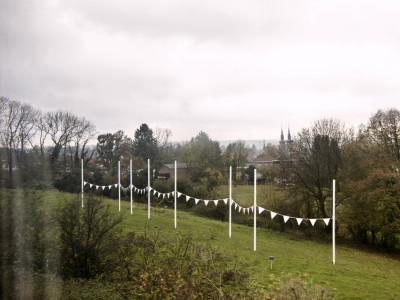
Sophie Nys
— Zuweilen, zuzeiten, immer
- –
- Entre la Gare de Welkenraedt et la Gare d'Eupen
Zuweilen, zuzeiten, immer is a garland of metal flags installed in a field between Welkenraedt and Eupen. Visible from the moving train, the 42 flags represent the number of people who lost their lives in the floods that ravaged several towns in the southeast of Belgium in the summer of 2021. The flags are hung half-mast and painted white – universal signs of solidarity that pay tribute to the victims. Sophie Nys conceived this work to accompany a period of national mourning while at the same time honouring survivors and their resilience in the wake of the traumatic event. This duality is also contained in the German-language title of the work, which the artist abstracted from a quote by poet Victor Hugo describing the banks of the river Vesdre in the nineteenth century: “sometimes a ravine/often a garden/always a paradise”. The flags’ rhythmic sequence mirrors the winding course of the river that is entangled with the train tracks, physically competing with the natural landscape through numerous tunnels. To underscore this link, the flagpoles are symbolically anchored in the ground close to the source of this river, near the German border.

Working with a variety of media and materials, Sophie Nys (°1974, Belgium) takes conceptual and minimalistic artistic strategies to their logical and formal limits, while maintaining the poetic eloquence of subjects derived from the everyday. Her art’s sparseness produces an ambiguous atmosphere, in which meaning emerges slowly but surely. Sophie Nys lives and works in Brussels.

The art trail Endless Express_ _is spread over different destinations along the railway line between Ostend and Eupen. Taking the public sculpture Esprit ouvert by Tapta as a symbolic point of departure, seven artists were invited to present new works around the stations and tracks. With the train as a unifying element, they explore the networked histories embedded in this landscape and entangled with this line. With new works by Che Go Eun, Inas Halabi, Flaka Haliti, Chloé Malcotti, Sophie Nys, Marina Pinsky and Laure Prouvost.
The Ostend-Eupen railway line is the longest in Belgium, traversing its three official language regions in about three hours — from the royal seaside resort in the west to the industrial river valley in the east, with the capital of Brussels in the centre. The train introduced shortly after Belgium was founded in 1830 — speaks in a broader way of industrialisation, the promise of progress, and how these forces have transformed this country.
The artists included in this exhibition are all based in Belgium or its neighbouring countries. Some imagine the train as a mythical creature re-enchanting the world, others question the notion of thinking in a straight line, as well as labour and its rhythms, or playfully disrupt the clockwork time that helped shape the society of speed we live in today.
Curator: Caroline Dumalin
